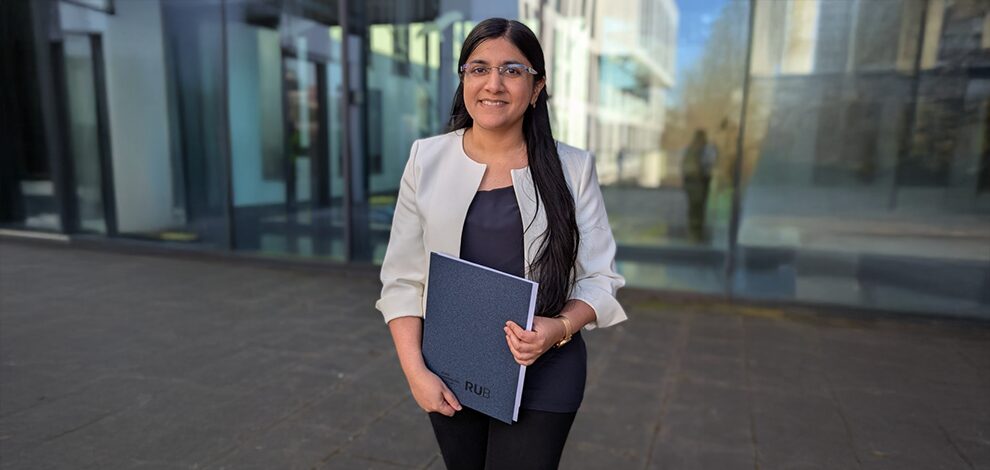Prof. Farah Afzal and her team are investigating the fundamental building blocks of matter: Their search for exotic particles begins at Jefferson Lab in Virginia, where they use the GlueX experiment to search for and study exotic hybrid mesons.
The new Emmy Noether Group at Ruhr-Universität Bochum (RUB) has set itself an ambitious goal: the search for exotic particles. Afzal's work focuses, for example, on a special type of hadron: Hybrid mesons, which consist of quarks, antiquarks and gluons. Detecting and researching these particles provides new insights into the strong interaction and structure of matter. The research project entitled "Exploring the meson spectrum with 3π photoproduction and the search for the exotic hybrid meson π1(1600) using the GlueX experiment" was launched in February 2025. The German Research Foundation is funding the project as part of an Emmy Noether Junior Research Group with around 2.2 million euros for up to six years.
The GlueX experiment: Using high-energy light to create new particles
Afzal works closely with the Jefferson Lab in Newport News, Virginia. The GlueX particle physics experiment is based there. It uses an electron accelerator to generate photons. These high-energy beams of light are shot at a proton target, creating various particles - a process known as photoproduction. Scientists can detect and analyze the particles using various detectors. "Hybrid mesons have already been predicted theoretically in research work on quantum chromodynamics, but with the GlueX experiment we want to detect them experimentally for the first time through photoproduction," explains Afzal.
This is no simple undertaking: Hybrid mesons have an extremely short lifetime of around 10-24 seconds, i.e. a trillionth of a trillionth of a second (!), before they decay. In order to clearly distinguish them from background events and known particles, it is important to study different production and decay mechanisms. Photoproduction at the GlueX experiment is one of them. For this work, data is recorded around the clock for several months at the Jefferson Lab.
New collaborations and international cooperation
Afzal is delighted to be based at the Ruhr-Universität with her Emmy Noether Group. "RUB is an excellent place to do hadron physics," she emphasizes. "The field is already well established here - with a good mix of experimental and theoretical research." In February 2025, Afzal took up a junior professorship here in Bochum after completing her master's and doctorate at the Rheinische Friedrich-Wilhelms-Universität Bonn and working there as a postdoc. She already has a long-standing collaboration with the Jefferson Lab: in 2023, she worked there for six months as a research scholar. The results of her research stay were recently published in the journal Physics Letters B:
Measurement of spin-density matrix elements in Δ++(1232) photoproduction
To the article


